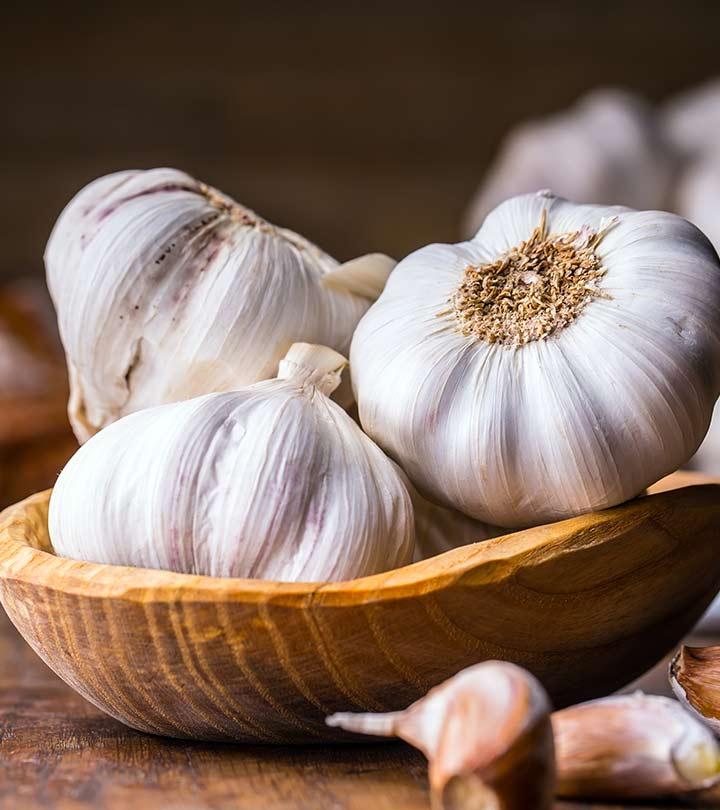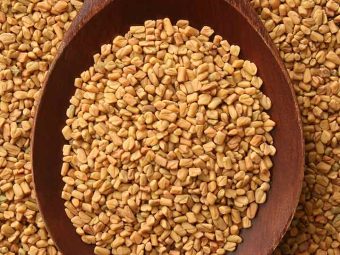14 Serious Side Effects Of Garlic (Foods To Avoid With It)
Anything in excess can be unhealthy and harmful for you, and so is garlic.

Garlic has a strong, pungent taste and is flavorful. This herb has medicinal properties. But, did you ever give a thought to the side effects of garlic?
Excess intake of garlic (Allium sativum) has been linked with bleeding, diarrhea, liver damage, vomiting, nausea, and heartburn.
This article explores the 14 adverse effects of garlic and things to consider before consuming it. Let’s get started.
In This Article
What Are The Side Effects Of Garlic?
1. May Cause Liver Damage
Excess garlic consumption may affect the liver. Though raw garlic has antioxidant potential, excess intake can lead to liver toxicity (1). As per rat studies, garlic in high doses (0.5 grams per kg of body weight) may induce liver damage. However, low doses of garlic (0.1 grams to 0.25 grams per kg of body weight) on a daily basis are safe for the liver (2).
2. May Cause Bad Odor
As per one Italian report, garlic breath and body odor were two of the most common adverse effects associated with garlic (3). Lack of personal hygiene is not the only cause of body odor, as consumption of garlic may result in it too (4).
Garlic odor has been found to linger in the mouth long after brushing. Certain experts believe that the chemicals in garlic that contribute to bad breath are the same chemicals that also render it its benefits (5). However, bad breath can be embarrassing. Hence, you probably need to think twice before consuming garlic. You may also take precautions and use a mouth-refreshing spray.
3. May Cause Nausea, Vomiting, And Heartburn
Anecdotal evidence suggests that consuming fresh garlic bulbs on an empty stomach may cause nausea, vomiting, and heartburn. Certain observational studies have also stated that taking garlic orally can cause heartburn and nausea (6). Excess garlic intake may also cause GERD (gastroesophageal reflux disease) in some individuals. More research is needed to understand this side effect of garlic.
4. May Cause Diarrhea
Consuming fresh garlic in excess can cause diarrhea. Garlic may trigger diarrhea as it may cause gas (7).
5. May Cause Gastric Issues
One Japanese study speaks about enteric-coated garlic products (products coated with a polymer barrier to prevent disintegration in the gastric environment). These garlic products, upon ingestion, resulted in the reddening of the gastric mucous membrane (8). The results suggest that caution must be exercised before using garlic and related products as they may have undesirable effects on gastric health.
In fact, as against popular belief, there is no evidence that links garlic intake to the prevention of gastric cancer (9).
6. May Lower Blood Pressure Way Too Much
Garlic may lower blood pressure (10). But if you are already on medications for high blood pressure, it may lead to hypotension (low blood pressure). Supplemental garlic has also shown to lower blood pressure levels (11). Hence, taking garlic supplements could be a bad idea when you are already on blood pressure medications. Taking garlic by mouth can also modestly reduce blood pressure (12).
7. May Aggravate Bleeding
Garlic may increase the risk of bleeding. Hence, it must not be taken along with blood-thinning medications like warfarin (13).
This is true especially in the case of fresh garlic. It also is better to stop garlic consumption at least 7 days before a scheduled surgery. Garlic has antiplatelet effects and may increase bleeding during surgery (14).
8. May Induce Sweating
As per some studies, garlic may also cause profuse sweating in certain individuals (15). However, we need more research in this regard.
9. May Cause Dizziness
Excess garlic intake can cause dizziness (16). The mechanism behind this action is yet to be studied.
10. May Cause Eczema Or Rashes
Prolonged contact with garlic may cause skin irritation. Some specific enzymes in garlic may lead to this irritation. As per anecdotal evidence, eczema could also be one of the conditions that accompany this allergy.
As per one study, frequent handling of garlic for cooking could lead to skin rashes (17).
11. May Interact With Certain Drugs
As per one study, garlic was found to interact with medications, such as chlorpropamide, fluindione, ritonavir, and warfarin (18).
12. May Cause Headache
Garlic, especially when taken in its raw form, could trigger migraines (19). Though it doesn’t directly cause a migraine headache, it activates the process responsible for it.
Though the exact reason for this is unclear, certain experts believe it may involve the trigeminal nerve – the major pain pathway in the body. Taking garlic may stimulate this nerve to release neuronal signaling molecules called neuropeptides that rush to the membrane covering your brain and cause headaches.
13. May Aggravate (Vaginal) Yeast Infection
Garlic cloves may irritate the tender tissue of the vagina (20). Certain women insert garlic cloves into the vaginas as a remedy to treat vaginal yeast infections. This is not recommended.
14. May Cause Vision Changes
It has been found that excessive ingestion of garlic can lead to a condition called hyphema, which refers to bleeding inside the eye chamber – the space between the iris and the cornea (16). Taking large doses of garlic, an anticoagulant, may cause or aggravate hyphema. Hyphema may also cause permanent vision loss.
Anecdotal evidence suggests certain other side effects of garlic too. Excess intake may cause loss of appetite. Garlic overdose may lead to kidney hematomas (swelling of clotted blood within the tissues of kidneys), chemical burns in the mouth, and life-threatening allergic reactions.
Garlic may also cause a condition called pemphigus, an autoimmune disease (21).
There is a list of foods that may cause side effects if taken along with garlic. We have covered those in the following section.
What Should You Avoid While Taking Garlic?
It is best you avoid consuming certain foods with garlic to keep the side effects at bay. These include:
- Clove
- Ginger
- Ginkgo
- Horse chestnut
- Red clover
- Turmeric
- Willow
- Capsicum
- Poplar
- Danshen
Infographic: Garlic At A Glance
Garlic is widely used in culinary delights and traditional home remedies. There is, however, a downside to every coin, and excessive garlic consumption can be detrimental to health.
Check out the infographic below to learn more about garlic, its recommended daily dietary intake, and some alternatives for this pungent condiment. Scroll down.
Illustration: StyleCraze Design Team
Side effects of garlic are usually associated with prolonged overconsumption. High doses of garlic may induce liver damage and trigger nausea, vomiting, heartburn, bad odor, gastric issues, sweating, dizziness, headaches, vision changes, and yeast infections. It may also lower blood pressure and interact with certain medications. You also must avoid garlic with clove, chestnut, ginger, and ginkgo to avoid undesirable side effects. However, moderate garlic consumption offers important benefits.
Frequently Asked Questions
How long does garlic stay in your system?
Garlic will stay in your system from 24 to 48 hours. Spices like garlic get excreted through your sweat as well as your digestive system.
Why does my stomach hurt when I eat garlic?
Garlic is high in fructans. Anecdotal evidence suggests that it may cause difficulty in digestion in some individuals. It may lead to abdominal pain, bloating, and gas in some people.
Does garlic elevate blood pressure levels?
There is no research to support that garlic can elevate blood pressure levels.
Does garlic induce labor in pregnant women?
There is no research to state the same. However, pregnant women can consult their doctor before taking garlic.
Sources
- Banerjee, S K et al. “Garlic as an antioxidant: the good, the bad and the ugly.” Phytotherapy research : PTR vol. 17,2 (2003): 97-106.
https://www.ncbi.nlm.nih.gov/pubmed/12601669 - Rana, S V et al. “Garlic hepatotoxicity: safe dose of garlic.” Tropical gastroenterology : official journal of the Digestive Diseases Foundation vol. 27,1 (2006): 26-30.
https://www.ncbi.nlm.nih.gov/pubmed/16910057 - Borrelli, Francesca et al. “Garlic (Allium sativum L.): adverse effects and drug interactions in humans.” Molecular nutrition & food research vol. 51,11 (2007): 1386-97.
https://www.ncbi.nlm.nih.gov/pubmed/17918162 - Senol, M, and P Fireman. “Body odor in dermatologic diagnosis.” Cutis vol. 63,2 (1999): 107-11.
https://www.ncbi.nlm.nih.gov/pubmed/10071744 - “Garlic.” Garlic – an Overview | ScienceDirect Topics.
https://www.sciencedirect.com/topics/medicine-and-dentistry/garlic - Martin Lopez, Juliana Ester. “Candidiasis (vulvovaginal).” BMJ clinical evidence vol. 2015 0815. 16 Mar. 2015
https://www.ncbi.nlm.nih.gov/pmc/articles/PMC4360556/ - Morales-González, José Antonio et al. “Garlic (Allium sativum L.): A Brief Review of Its Antigenotoxic Effects.” Foods (Basel, Switzerland) vol. 8,8 343. 13 Aug. 2019.
https://www.ncbi.nlm.nih.gov/pmc/articles/PMC6722787/ - Hoshino, T et al. “Effects of garlic preparations on the gastrointestinal mucosa.” The Journal of nutrition vol. 131,3s (2001): 1109S-13S.
https://www.ncbi.nlm.nih.gov/pubmed/11238827 - Kim, Hanseul et al. “Garlic intake and gastric cancer risk: Results from two large prospective US cohort studies.” International journal of cancer vol. 143,5 (2018): 1047-1053.
https://www.ncbi.nlm.nih.gov/pubmed/29569711 - Ried, K et al. “Aged garlic extract reduces blood pressure in hypertensives: a dose-response trial.” European journal of clinical nutrition vol. 67,1 (2013): 64-70.
https://www.ncbi.nlm.nih.gov/pmc/articles/PMC3561616/ - Ried, Karin et al. “Effect of garlic on blood pressure: a systematic review and meta-analysis.” BMC cardiovascular disorders vol. 8 13. 16 Jun. 2008.
https://www.ncbi.nlm.nih.gov/pmc/articles/PMC2442048/ - Pedraza-Chaverrí, José, et al. “Garlic Prevents Hypertension Induced by Chronic Inhibition of Nitric Oxide Synthesis.” Life Sciences, Pergamon, 25 Feb. 1998.
https://www.sciencedirect.com/science/article/abs/pii/S0024320597011557 - “Garlic.” National Center for Complementary and Integrative Health, U.S. Department of Health and Human Services.
https://nccih.nih.gov/health/garlic/ataglance.htm - Pradhan, Sameer L, and Priya S Pradhan. “Ayurvedic medicine and anaesthesia.” Indian journal of anaesthesia vol. 55,4 (2011): 334-9.
https://www.ncbi.nlm.nih.gov/pmc/articles/PMC3190505/ - Banerjee, Sanjay K, and Subir K Maulik. “Effect of garlic on cardiovascular disorders: a review.” Nutrition journal vol. 1 4. 19 Nov. 2002.
https://www.ncbi.nlm.nih.gov/pmc/articles/PMC139960/ - (2018). Analysis of Garlic Effects on Human Health in the World. 49. 30-40.
https://www.researchgate.net/publication/328675985_Analysis_of_Garlic_Effects_on_Human_Health_in_the_World - Lee, T Y, and T H Lam. “Contact dermatitis due to topical treatment with garlic in Hong Kong.” Contact dermatitis vol. 24,3 (1991): 193-6.
https://www.ncbi.nlm.nih.gov/pubmed/1831097 - Izzo, Angelo A, and Edzard Ernst. “Interactions between herbal medicines and prescribed drugs: an updated systematic review.” Drugs vol. 69,13 (2009): 1777-98.
https://www.ncbi.nlm.nih.gov/pubmed/19719333 - Roussos, Alexander P, and Alan R Hirsch. “Alliaceous migraines.” Headache vol. 54,2 (2014): 378-82.
https://www.ncbi.nlm.nih.gov/pubmed/23551212 - InformedHealth.org [Internet]. Cologne, Germany: Institute for Quality and Efficiency in Health Care (IQWiG); 2006-. Vaginal yeast infections (thrush): What helps? 2019 Jun 19.
https://www.ncbi.nlm.nih.gov/books/NBK543219/ - Ruocco, V et al. “A case of diet-related pemphigus.” Dermatology (Basel, Switzerland) vol. 192,4 (1996): 373-4.
https://pubmed.ncbi.nlm.nih.gov/8864379/



![unknown facts about garlic [infographic]](https://cdn2.stylecraze.com/wp-content/uploads/2013/09/Ingredient-Spotlight-Garlic-Final-scaled.jpg)










